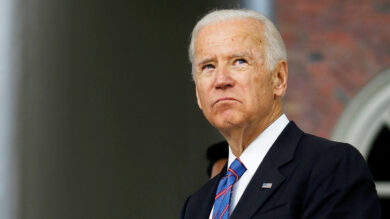WASHINGTON — Top leaders from both sides of the aisle reassured Americans on Wednesday that the U.S. won’t default on its debt as tense negotiations over the debt ceiling continued.

“I think at the end of the day we do not have a debt default,” House Speaker Kevin McCarthy told CNBC in a “Squawk Box” interview Wednesday morning.
Biden spoke minutes before he departed Washington for a truncated visit to Asia, where he plans to attend the Group of Seven summit. He also said he would hold a news conference Sunday upon his return to share the latest on the negotiations.
The House speaker’s and the president’s remarks were the latest signs that negotiations, which had been stalled for months, were now moving into a more serious and concrete phase, and potentially closer to a deal.
Leaders are running out of time to raise the debt ceiling before a June 1 deadline when the government is set to run out of money. McCarthy met Tuesday with Biden at the White House alongside Vice President Kamala Harris and other top congressional leaders in an attempt to hammer out a deal before the president left for Japan.
McCarthy refrained from saying Wednesday that he was optimistic about the state of the talks, but said he was encouraged by Biden’s willingness to negotiate.
“The only thing I’m confident about is now we have a structure to find a way to come to a conclusion,” McCarthy said. “The timeline is very tight. But we’re going to make sure we’re in the room and get this done.”
Lifting the debt ceiling is necessary for the government to cover spending commitments already approved by Congress and the president — and prevent default. Doing so does not authorize new spending. But House Republicans have said they will not raise the limit if Biden and lawmakers do not agree to future spending cuts.
McCarthy and House Minority Leader Hakeem Jeffries in separate interviews Wednesday morning on “Squawk Box” agreed that negotiations were moving forward, but the two remained entrenched in their positions.
Jeffries called a Republican request to attach work requirements to federal food benefits a “nonstarter” but said he remains optimistic about negotiations.
“It was a very positive meeting yesterday,” Jeffries said. “It was calm. It was candid in terms of the discussion and I’m optimistic common ground will be found in the next week or two.”
Jeffries noted the last time work requirements were proposed, in the 2018 Farm Bill, Republicans including McCarthy voted against it.
“It’s entirely unreasonable to think that at this particular point in time, in the context of a debt ceiling showdown that has been manufactured, as part of an effort to avoid default, that these types of so-called work requirements can be imposed on the American people,” he said.
McCarthy on the other hand maintained that work requirements were the “responsible” thing to do, and noted that Biden voted in favor of work requirements when he was a senator.
“Work requirements only go to those able-bodied people with no dependents,” McCarthy said. “You could be in school and be waived. You could be looking for a job and be waived. But what we’ve found is with every statistical data is that it helps people get a job, it helps our supply chain, it helps the economy and the individual even stronger, and that’s what we should be doing.”
While Republicans have been pushing for work requirements, Democrats have been asking for revenue-raising mechanisms to be part of the debate. McCarthy said taxes would not be discussed.
“There is not going to be a tax discussion in this debt ceiling,” McCarthy said. “The president admitted that yesterday.”
Leave a Reply